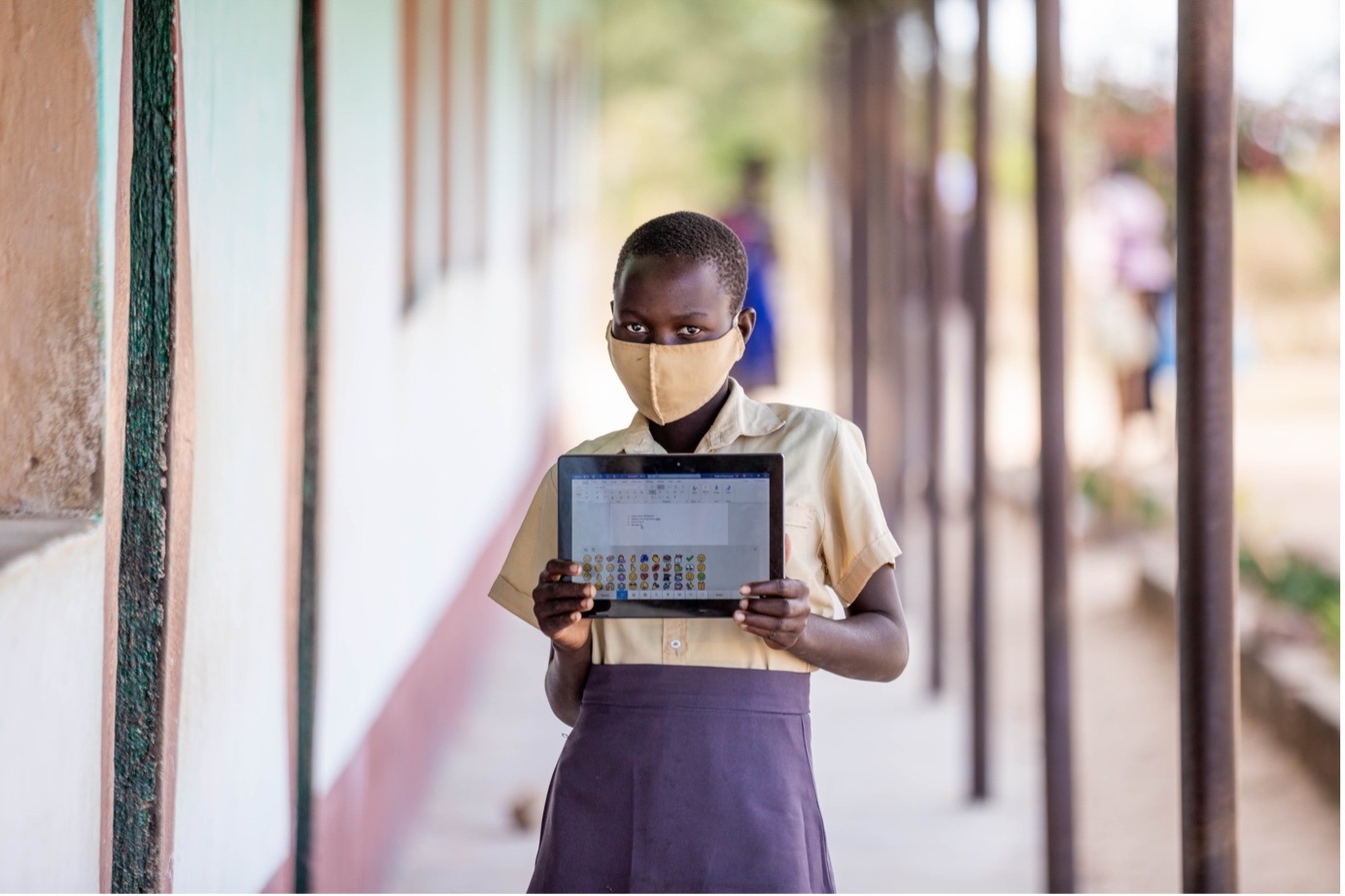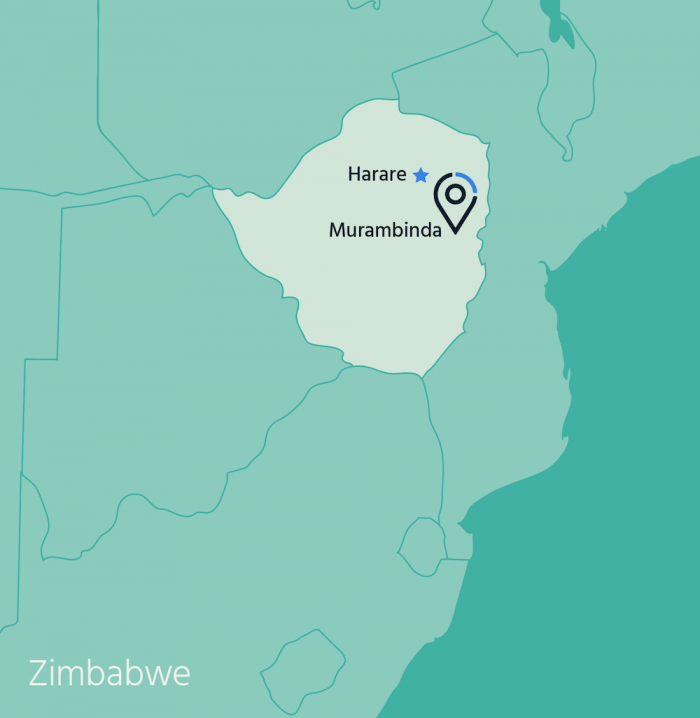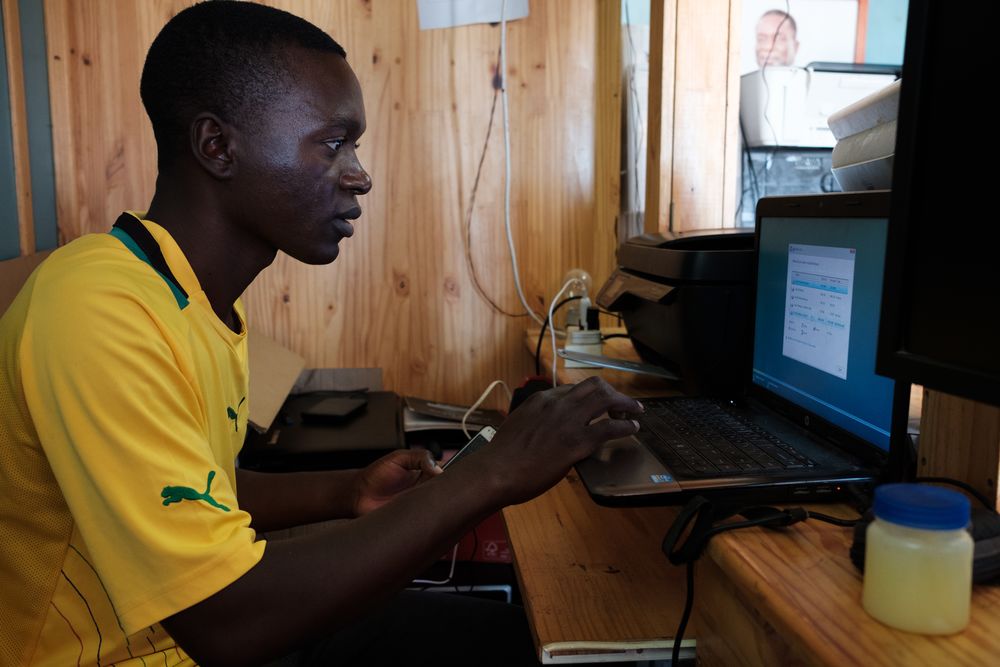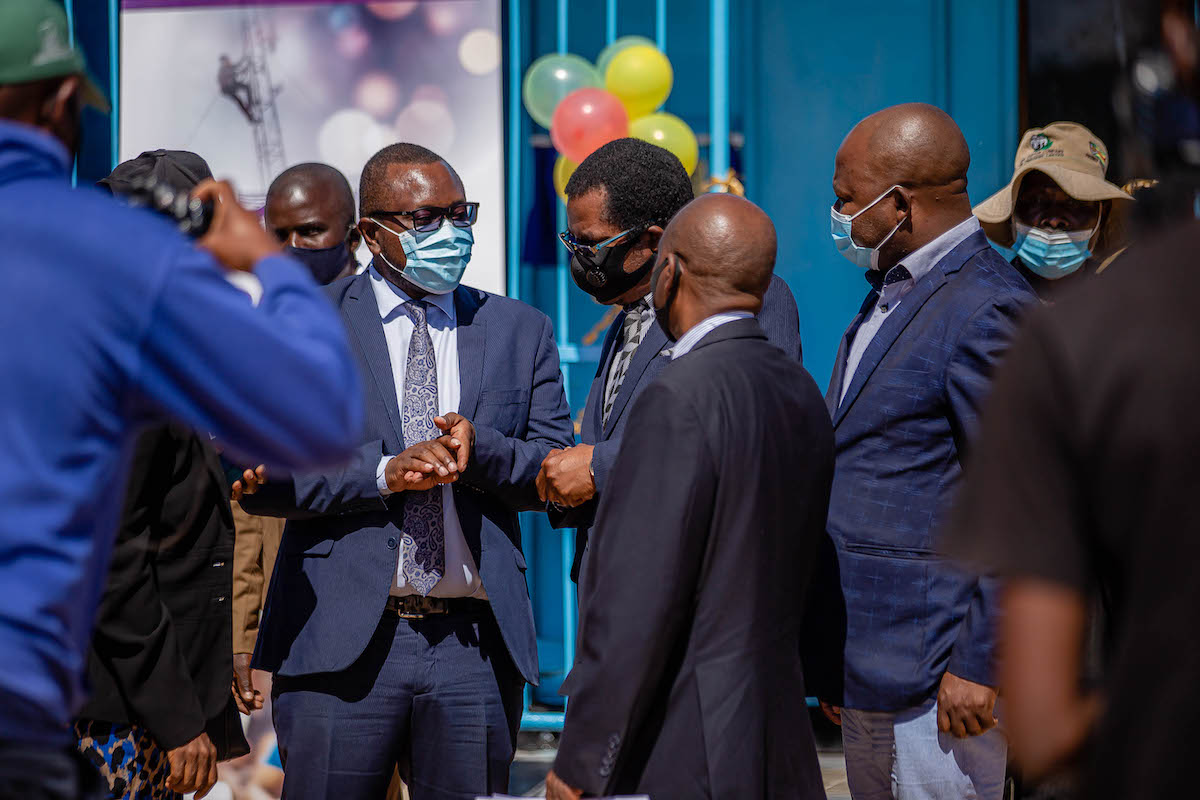
Scaling Opportunity with Murambinda Works
A community network in Zimbabwe grows from cyber café to local hub of knowledge, healthcare, and development, realizing the Internet as a place of possibility.
How does a modest cyber café become an Internet powerhouse? It takes a mix of foresight, innovation, and determination.
The town of Murambinda, located approximately 294 kilometers from the capital city of Harare, is making an impact far beyond its borders. The community has traditionally relied on agriculture to provide subsistence and trade, but in recent years it’s made groundbreaking strides in education, healthcare, and ICT development for local businesses. In 2001, they established Vision Internet, a cyber café housed in an old shipping container. Developed by local residents skilled in welding, art, and paintwork, Vision Internet embodies the spirit of ubuntu*, a shared humanity. Since then, it has grown to serve far more than Murambinda’s few thousand residents, thanks to a bustling and vibrant community network.
“We are so excited that the Internet has been brought to the village,” said Hope, a young university student who has reaped tremendous benefits from digital learning. “Schooling as we know it has changed, and my friends and I can now access the Internet and get any information at any time of the day on any topic we want.”
With a population of 4,000, Murambinda is a “growth point.” The community network connects the district headquarter offices and spans a radius of 40 kilometers up to Nerutanga along Chivu Road. It has earned the name Murambinda Works through a public communications access system that reaches beyond the town itself, covering a population of 108,000, and providing accessible and affordable Internet to underserved communities in Buhera North and West.
*Ubuntu is a word from the Nguni family of languages in Southern Africa. It refers to the African philosophy that individual humanity can only be expressed through our engagement with others.

UNICEF, the ITU Development Sector, the Zimbabwean Ministry of Communications, POTRAZ, and the Internet Society Zimbabwe Chapter
participated in the launch of Murambinda Works community network in May 2021.
UNICEF Zimbabwe/2021/Kudzai Tinago
Bridging the Digital Divide
Zimbabwe has a population of over 14.6 million people, 32% of which reside in urban centers and 68% live in rural areas (World Bank 2019). By the end of the first quarter of 2020, Posts and Telecommunications Regulatory Authority (POTRAZ) reported a 56.2% increase in the use of mobile Internet and data traffic. However, there is an imbalance in urban-rural connectivity, with 52% access in urban areas, increasing the digital divide. Internet coverage in rural areas is thus a priority driven by the National Information and Communications Technology (ICT) policy.
In the last two decades, Zimbabwe has undergone political, health, and social challenges that, coupled with an unstable currency and hyperinflation, has made the implementation of any project next to impossible. The Murambinda community network was successful despite all odds, thanks to the passionate community driving the project and a multi-sector approach that brought everybody together.
Looking back, we had no access to general information, current affairs and national updates, and newspapers did not reach our community, resulting in rural-urban migration to city centers in search of vital information.”
Without connectivity, villagers faced many challenges. Students were forced to make long-distance, costly trips to pick up university registration forms. This was coupled with a debilitated courier postal service. In the medical sector, health practitioners were not able to undertake research and communicate effectively about personal, patient, and professional needs. With a lack of funds in the education sector students faced a shortage of learning materials, an issue that online resources could address.

Luke Chamangwana (left) making photocopies for a client inside the converted shipping container that houses the Murambinda Works Internet café in Murambinda, Zimbabwe on 24 May 2018.
Internet Society / Nyani Quarmyne / Panos Pictures
Cyber Café Turned Internet Powerhouse
Initially a cyber café, Vision Internet offered dial-up Internet, photocopying, and printing services. It served as a safe haven for young people, who could drop by to watch films or videos and play games. Twenty years later, the cyber café acts both as a resource center and information hub, serving workers, school officials, parents, students, business people, and residents in the district.
Bishi is one of three brothers who founded Vision Internet, which became known as Murambinda Works in 2008. His mother worked as a hospital maid at the time, assisting health practitioners. Without a single newspaper reaching Murambinda, doctors, nurses, and teachers lacked access to current affairs and up-to-date information. Foreign health personnel had no means of communication to further their studies and were not able to keep in touch with family members abroad.
As “the center for solutions,” the cyber café began to offer digital literacy training for community representatives, followed by requests from both the education and health ministries. The small Internet hub began to grow steadily, connecting selected schools and increasing community engagement services and activities. This led to schools investing in their own photocopier machines to ease travel and time costs, and facilitating their own online school registrations. Other sectors in district offices, health, and agriculture began to take on more to ensure inclusive approaches to connectivity, and the notion of Murambinda Works emerged – a combination of unity, creativity and resilience, and the bedrock of true African spirit.
Murambinda Works has increased its scope since then, supporting orphans and vulnerable children through the Murambinda Foster Home. Bishi said, “This was a vision passed on from my late mother and is the only orphanage in the whole district, providing temporal stays for orphans before they are placed into homes.”
Joseph Bishi, co-founder of Vision Internet and implementer of the Murambinda community network project.
Internet Society / Nyani Quarmyne / Panos Pictures
Developing the Community Network
An affable tech guru who also directs Murambinda Works as project manager, Bishi leads a team of six: three in information and communications technology, one in administration, and two in marketing. He is passionate about bringing about positive change through skills building, sharing information, and knowledge exchange and transfer in Murambinda, which is also his rural home or kumusha.
Growing up in this rural community, he grappled first-hand with the realities and challenges confronting their marginalization in all spheres of life. The Murambinda growth story is not only deeply personal to Bishi and his brothers, but a true reflection of the value of working collectively in the spirit of community development. Their mantra:
It is possible for one to leapfrog into a new, dynamic, and powerful world where, if you exist, you can never be ignored.”
In 2012 as confidence grew in the community network, the Ministry of Education engaged Murambinda Works to train its entire cadre of district teachers on basic computer literacy, engaging new approaches using the Internet. The shift had begun. However, at the time, implementing fiber infrastructure for wider Internet connectivity to institutions in remote areas like schools and health facilities proved costly. It left a sense of hopelessness in the community.
The Passion Behind the “Works”
Bishi’s expertise is a combination of network planning, point-to-point and point-to-multipoint wireless radio distribution, and installations. His technical training from the Internet Society enabled him to travel extensively to lend his skills to other countries in the region, blending global expertise and in-country knowledge with his grassroots understanding. In mid-2016, he mentored Masters and PhD students at the University of Cape Town development lab in South Africa, sharing experiences on community engagement and network deployment using TV white space technology.

George Mangwiro, a polytechnic student on work placement, replacing a laptop hard drive inside the converted shipping container that houses the Murambinda Works Internet café in Murambinda, Zimbabwe on 24 May 2018. Internet Society / Nyani Quarmyne / Panos Pictures.
In November 2016, he joined the pioneering team of the Community Networks Summit in Africa, sponsored by the Internet Society in Kenya, gaining further insights on how to deploy a community network, and equipping him with the vital skills to broadcast Internet via cost-effective wireless means. “This was exciting for me. A solution to what my community had been asking for was birthed from such priceless encounters with experts. It helped me to come back home and discuss with the community how we could do this, looking at policy, since at the time, it was illegal to broadcast a 5GHz and 2.4GHz point-to-point radio for more than 100 meters. So, we began the journey on how to implement this until we got our pilot license for Murambinda Works,” he said. Bishi’s track record in connectivity and custom app development also saw him play an active role in hospitals in rural Masvingo, approximately 154 kilometers from Murambinda.
In late 2018, Emily Chibvongodze, CEO of the Buhera District Council, led a successful community engagement workshop. It involved relevant stakeholders, including the late local chief Murambinda himself and village headmen from the mountainous regions. Culturally, mountains are sacred landmarks in rural areas, a place for prayers and rituals, thus careful entry points were critical to secure buy-in from chiefs and traditional leaders.
You don’t impose feedback for solutions, you bring authorities together as users [especially] since they were calling for solutions to expand on connectivity to their respective government institutions. They saw the proposed network infrastructure with coverage in a cost-effective way, and the school management system and local content platform as a method of working together with the community.”
Chibvongodze also chairs the Murambinda community network board, with Bishi as vice chair, and individual representatives from the business community, the health and education sectors, the faith-based community, and traditional authorities.
A joint proposal led to the deployment of a community network in 2019, funded by the Internet Society, with a 40-kilometer radius network with the capacity to cover 80 schools. The installation site was initially built using point-to-point and point-to-multipoint wireless radios, solar-powered wireless transmission, and a mesh topology network.
In 2020, Murambinda Works partnered with TelOne, a leading telecom operator in Zimbabwe, to gain access to their fiber backbone, ensuring sufficient bandwidth for. In early 2021, they also developed software applications (apps) to add value to the network. One software app they developed was a school management system that linked schools to the district education offices. This gave educational inspectors access to vital information without having to travel.
“At the time, we had no license for community networks in Zimbabwe, so we applied to POTRAZ. They allowed us to run a pilot learning case study which has subsequently been assessed and endorsed. They are agreeing to and seeing the great purpose and related benefits of this model. We’re excited that the 5GHz and 2.4GHz spectrums will now be availed for innovation to solve challenges confronting the youth in relation to connectivity,” said Bishi. Following this successful pilot, POTRAZ invited Murambinda Works to submit a consultation paper on the policy discourse around Light Licensing of the 2.4GHz and 5GHz band in Zimbabwe.
Currently, Murambinda town has access to TelOne fiber as part of the National Fiber Infrastructure project, which is under-utilized owing to high installation costs. Additionally, 3G coverage is available from three different mobile operators, but this service tends to be unreliable when the electrical grid is out, an issue Murambinda addresses with solar and biogas power systems.
Through TelOne, the Murambinda community network receives 25Mbps of traffic which is shared among the eight institutions connected to the access site. It is comprised of four community Wi-Fi spots that provide connectivity to surrounding schools, the nurses training school, council offices, households, and farms. It also connects the cyber café, financial service providers, the hospital, and local government offices.
Precious Machekano, a registered nurse studying for a midwifery qualification at the Murambinda Mission Hospital School of Midwifery, in Murambinda, Zimbabwe on 22 August 2018.
Internet Society / Nyani Quarmyne / Panos Pictures
Connectivity Is the Way to Go
Vision Internet’s groundbreaking transition from a cyber café to a community network was a result of combined stakeholder and community efforts. Through training of the entire district and intensive exposure, the community network has transformed in the last decade into a trusted community partner on ICT matters and Internet.
This is now a fully-fledged [community network], the crowning of the long perceived and desired vision, which is refreshing, interesting, and exciting. We believe we will have many communities connected beyond Murambinda, across the country.”
Murambinda Mission Hospital is now one of the best in the country. This is in part thanks to its Internet access, which facilitated advanced research technology and doctors’ ability to gain knowledge. The hospital is the first to treat patients with a low-cost technology to test viral loads in people with HIV. It also offers improved care and treatment for tuberculosis and HIV. The facility has moved beyond care at district level to national level, where patients come to the hospital for treatment from as far away as Harare, a nearly four-hour drive. Access to quality health care has seen marked improvements, thanks to connectivity.
“The Internet has put us on the map … and has brought a host of advantages for our learners. Last year, a learner in one of our connected schools scooped a science exhibition national prize […] because of the research he had access to, owing to the Internet. So, Internet connectivity is the way to go!” said Nelson Magwede, a Ministry of Education inspector in the district.
To partially sustain itself, Murambinda Works generates revenue by providing ICT-related services such as the use of the cyber cafés facilities for Internet access, photocopying, binding, training for government agencies, and computer repairs and maintenance. Despite these notable strides, when the COVID-19 pandemic struck it threatened to reverse health and education gains made in the community.
The Story of Hope

Hope Mubayiwa is a second-year student at the University of Zimbabwe, and his future is bright. Through his geology studies, he dreams of making a big impact on the world. Prior to the pandemic, Hope was based at the campus, using textbooks, libraries, and attending face-to-face lectures. Internet access and availability was both costly and constrained with data bundles. At a price of more than US$30 per month, it was unaffordable for the young student.
The Murambinda Works community network changed that. He can now study online from his home, more than 250 kilometers from the university. “It has been a great blessing,” he says.
Online learning has boosted Hope’s motivation to study harder and has helped alleviate his fear and shyness of face-to-face teaching. “I have been able to quickly do my research and write my assignments […] given the speed and efficiency of the Internet. No more issues of data bundle inconvenience and hotspot uncertainties.” He’s inspired by the power of the Internet. When he completes his studies in 2023, he plans to become an office geologist, focusing on seismic waves and map analysis. He believes he can play a part in helping geologists, archaeologists, miners, and water resource specialists better scope, define, and implement their work. By doing this, they can help address public health and climate risks, including disaster preparedness. It’s something the world needs now more than ever—Hope.
“I am going to tell my fellow colleagues to raise their curiosity about what the Internet is all about.”
Communicating Amidst a Pandemic
When the COVID-19 pandemic had a negative impact on many communities, Murambinda was not spared. It affected livelihoods in addition to causing infections and subsequent deaths. At the same time, other complications took the life of Mr. Simbarashe, a long-standing leader and champion in Murambinda Works. These challenges were a critical turning point to the community network, but Joseph wanted to keep Mr. Simbarashe’s legacy alive.
The pandemic demonstrated the critical importance of Murambinda Works’ expanded network. With a grant of US$9,000 from the Internet Society in September 2020, the community network quickly built a tower and Wi-Fi hotspots in residential areas. It enabled business as usual despite lockdown restrictions, with local residents able to work from home and access essential services during isolation periods.
“The government has been successful in managing the education sector through providing personal protective equipment (PPE) and adhering to COVID-19 protocol guided by WHO policy; here, the Internet played a very important role in terms of ensuring that these policies are successfully implemented,” said Magwede.
Ushering in a New Era
From the beginning, Murambinda Works has received much-needed political commitment. “Collective efforts are critical to sustain the value of Internet connectedness now more than ever,” said the Minister of Information Communications and Technology (ICT) and Courier Services, Honorable Jenfan Muswere at the official commission of the Murambinda Works community network in May 2021. More than 300 people attended this event, including POTRAZ and TelOne, alongside CEOs of leading Internet Service Providers (ISPs) in Zimbabwe, key stakeholders and community representatives, underscoring the importance of a multi-sectoral approach to connectedness.
Director-General of POTRAZ, Gift Machengete, emphasized the importance of the unique power of the Internet towards equalizing opportunities for all. “What we are seeing here is the beginning of a new revolution, what we are witnessing here is the ushering in of a new era … community networks ensure greater Internet access and use to those previously left behind.”

UNICEF, the ITU Development Sector, the Zimbabwean Ministry of Communications, POTRAZ, and the Internet Society Zimbabwe Chapter participated in the launch of Murambinda community network in May 2021. UNICEF Zimbabwe / 2021 / Kudzai Tinago
In December 2018, POTRAZ provided free spectrum for the Murambinda pilot project, supported by the Internet Society, with an investment of US$45,000.
The ICT Minister endorsed the Government of Zimbabwe’s full support of Murambinda Works, echoing the valuable role of the Internet in today’s ever-changing world. “We are living in unprecedented times … where Internet connectivity is no longer a luxury but a basic need for day-to-day survival. Whether one stays in an urban area or in a rural area, the Internet is now more important than ever. As the COVID-19 pandemic reshapes the way we work, keep in touch, go to school, and shop for essentials across the world, it has never been more important to bridge the urban-rural divide.”
We are living in unprecedented times … where Internet connectivity is no longer a luxury but a basic need for day-to-day survival.”
In the Pipeline
These innovative activities are in the pipeline to expand and sustain Murambinda Works:
- Hotspots at the market, bus station, restaurants, and other public places
- Fixed access to commercial businesses in the area, including the mining sector
- Reselling hotspot access to mobile operators, offering the mobile operators such as Econet Wi-Fi hotspots on the CN infrastructure in Murambinda and other locations
- Schools can adopt the aquaponics Internet of Things (IoT) initiative that has been successfully piloted by the Internet Society’s Zimbabwe Chapter to generate income to meet connectivity costs
- Offer schools connectivity at affordable rates
- Revenue-generating fish ponds and gardens monitored by internet devices
- Voucher purchasing and private home and business connections
- Provide incentives for young people to stay in the community
The Murambinda community network provides access to surrounding schools, connecting more people to opportunity.
UNICEF Zimbabwe/2021/Kudzai Tinago
Connecting to the Future
Operating initially on a pilot license, the Murambinda model’s feasibility and practicality has been tested and endorsed for wider implementation by the Ministry of ICT and Courier Services. The results are already fulfilling their purpose. Murambinda Works demonstrates a cost-effective model that can be expanded to other areas—while preserving the African cultural value of sharing. “Like sadza and relish, a traditional Zimbabwean dish that is eaten from one plate by many people, likewise we are sharing the [Internet …] collectively using all the resources, the infrastructure, and the bandwidth, which can be replicated across the country,” said Bishi.
It doesn’t end here. POTRAZ has since introduced new licensing for the use of the 2.4GHz and 5GHz spectrum. It uses the same technology: affordable wireless products that are cheaper and affordable. Murambinda Works has transitioned into a Centre of Excellence, the benchmark initiative for rural districts to replicate. Stakeholders have seen the efficiency and benefits of this innovative model—sure steps towards bridging the digital divide in Zimbabwe, empowering communities to bring about solutions for themselves, by themselves.
The Internet becomes a homegrown initiative, having a real sense of community ownership, whilst protecting all our endeavours as we move forward.”
Going forward, the Murambinda community network will continue to embrace the power and reach of the Internet. It is an exciting technological nirvana with demonstrated potential to change lives and better build and sustain communities—especially those in hard-to-reach areas. The Internet shows a sustainable way to empower community ecosystems “so it becomes,” according to Magwede, “a homegrown initiative, having a real sense of community ownership, whilst protecting all our endeavours as we move forward.”
Leading image: The Murambinda Works community network provides access to surrounding schools, connecting more people to opportunity.
UNICEF Zimbabwe/2021/Kudzai Tinago